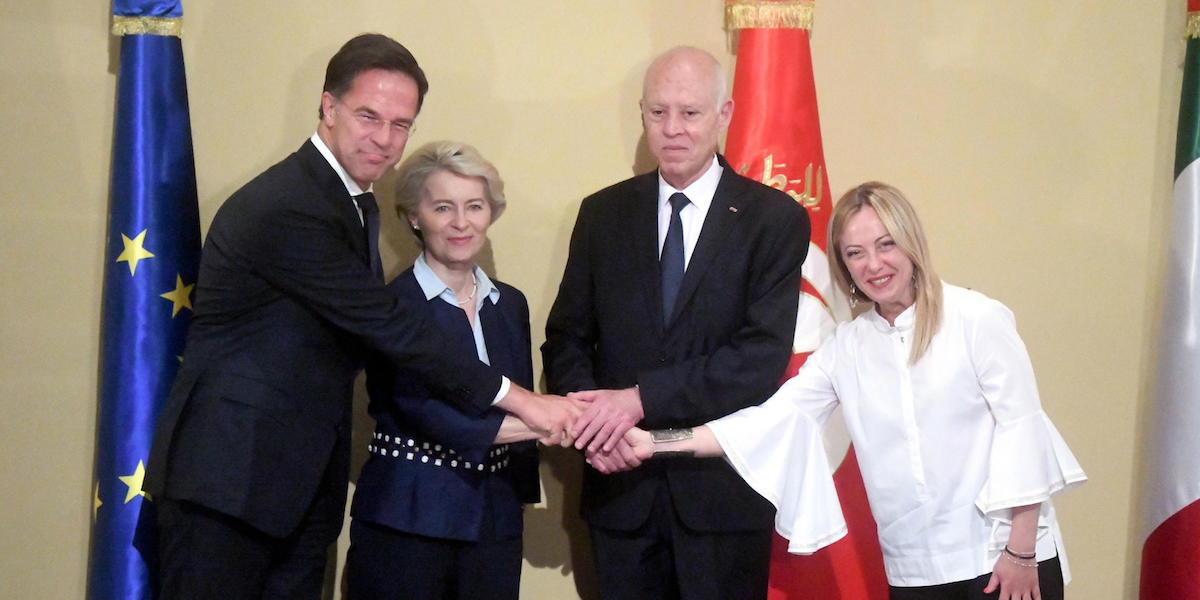Loading player
The so-called “memorandum of understanding” between the European Union and Tunisia was signed on Sunday in Carthage, near Tunis, which aims to provide financial aid to the Tunisian government of around one billion euros and which should limit the departures of migrants from the Tunisian coast. The president of the European Commission Ursula von der Leyen communicated this with a post on her social channels, who was accompanied on the official visit by the Italian Prime Minister Giorgia Meloni and the Dutch Prime Minister Mark Rutte.
For Meloni it is the third visit to Tunisia in just over a month: she had gone alone for the first time on June 6, and then already with von der Leyen and Rutte on June 11. In the last visit, talks with the Tunisian president, the authoritarian Kais Saied, had only led to the signing of a declaration of intent, while on Sunday the agreements were defined.
#TeamEurope is back in Tunis.
We were here together a month ago to launch a new partnership with Tunisia.
And today, we take it forward. pic.twitter.com/fcSJ3Hw1GY
— Ursula von der Leyen (@vonderleyen) July 16, 2023
The memorandum of understanding provides that the European Union will offer Tunisia financial aid in the form of a loan at subsidized rates of 900 million euros – to be disbursed in installments over the next few years – as well as two non-repayable contributions of 150 million respectively euros, as a contribution to the national budget, and 105 million euros to prevent the departures of migrant boats. This latter aid actually replicates on a smaller scale those given in recent years to Libya and Turkey to forcibly prevent the departures of migrants and asylum seekers.
This money comes in addition to the International Monetary Fund (IMF) loan of 1.7 billion euros which has been talked about for a long time and that he had been asked by Tunisia to try to resolve his complicated economic and social situation. The loans from the European Union will be subject to an agreement to be found between Tunisia and the International Monetary Fund, while the grants of 150 and 105 million should arrive in a short time. In exchange, Tunisia would undertake to apply some reforms requested by the IMF, and to collaborate more in blocking the departures of migrants and asylum seekers who try to reach Italy by sea.
In describing the agreements signed with President Sayed, the President of the European Commission von der Leyen spoke of five “pillars”: macro-financial assistance, strengthening of economic ties, cooperation on renewable energy sources, migration control and promotion of cultural exchanges and tourism (thanks to an increase in air connections).
European governments were especially interested in measures to contain the departures of migrants, which should consist of an increase in checks and blockages of departures. At the end of the meetings, the Prime Minister Meloni announced that a “conference on migration” will be held in Rome on Sunday 23 July: the Tunisian president Saied will be present, but also “several Mediterranean heads of state and government”.
– Read also: Tunisia has abandoned hundreds of migrants in the middle of the desert
There has been much criticism of the agreement in recent weeks due to the violence that has been going on for some time in the country, both by the local population and by the authorities, against sub-Saharan migrants who pass through the country in the hope of leaving by sea for the Europe (and especially towards Italy). For months, President Kais Saied – who in the last three years has given an authoritarian turn to the government of the country – has been using migrants as a scapegoat to explain the terrible economic and social situation in which Tunisia finds itself.
– Read also: Protests against Saied’s repressions in Tunisia
